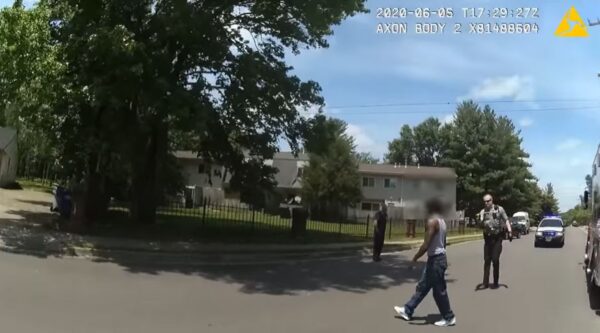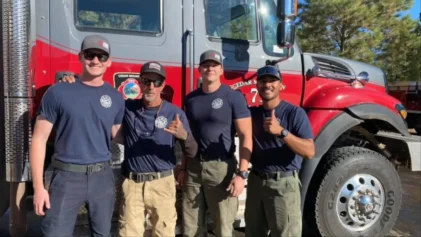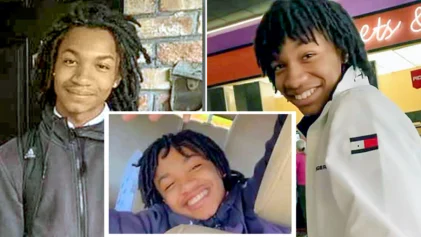A Virginia county has settled a federal lawsuit filed by a resident who claimed a member of the county’s police force violated his civil rights during a 2020 arrest.
In March 2021, La Monta Gladney, a 38-year-old Black man, filed a federal lawsuit against Fairfax County Police Officer Tyler Ryan Timberlake, claiming Timberlake violated his civil rights by tasing him without provocation, kneeling on his back and neck, and then arresting him without cause.

The two sides reached agreement on the settlement in late April pending approval by the county’s board of supervisors, which reportedly came on May 10.
The events that led to Gladney’s encounter with Timberlake began on June 5, 2020. Gladney told the Washington Post last year that the crisis started when a female friend began experiencing some kind of medical distress and he went outside to seek help.
Video of the Mount Vernon-area incident from a Fairfax County officer’s bodycam showed Gladney, who was unarmed and had no outstanding warrants, pacing in a circle and trying without success, to communicate with emergency personnel on the scene. Other reports note he was rambling incoherently and later was found to have had phencyclidine, a street drug known as PCP or angel dust, in his system.
Gladney says in the footage to an officer, “I want to detox,” and the officer seems to want to help. There is no threat or antagonizing at this point.
The video shows another officer and the emergency personnel trying to get him into an ambulance vehicle for assistance for his crisis, but then Timberlake is introduced to the scenario and the already frustrating situation is elevated.
Timberlake, who had been on the force for eight years prior, arrives on the scene and immediately pulls his Taser weapon and fire it at Gladney, seeemingly without a full assessment of the nature of the real-time challenge Gladney and other officers were experiencing. Timberlake’s attorneys would later say he misidentified Gladney as another man who had outstanding warrants.
As Gladney falls to the ground, the officer places his knee on the man’s back and neck. Timberlake, without lifting his knee, smacks him in the face and shoots him with the stun gun another time. Gladney cries out, “No!” He also yells, “I can’t breathe.” He was arrested on charges of public drunkenness and resisting arrest, charges that were later dropped.
His lawsuit states Gladney suffered “serious physical and emotional injury” because of the altercation.
Timberlake was charged with three counts of misdemeanor assault and battery the day after the incident. In March his case went to trial, where he was found not guilty on all counts.
In a statement, Jeff McKay, Chairman of the Fairfax County Board of Supervisors, said the settlement does not include an admission of liability or guilt.
McKay wrote, “Moving forward, I have full faith in [Fairfax County Police] Chief [Kevin] Davis and our police department to continue making progress on important issues such as the use of force, de-escalation, communication, community outreach, and building trust.”
“Fairfax County is the safest jurisdiction of its size in the U.S. and that is due to our police department and our community working together to achieve this,” the official continued. “Safety and justice can absolutely go hand-in-hand, and Fairfax County will continue to strive to meet this critical moment.”
While details of the settlement are confidential, An amended complaint filed in the U.S. District Court in Alexandria, Virginia, in May 2021, noted a request from Gladney to be compensated for various losses he experienced as a result of the altercation and arrest. Included in the lawsuit was a petition to have government procedures adjusted to prevent excessive force from being used by law enforcement within their jurisdiction in the future to others in the public.
Timberlake’s lawyer contended at his trial that his client actually saved Gladney’s life by tasing him, using medical expert William Bozeman to substantiate the theory.
According to Timberlake’s defense, Gladney was experiencing “excited delirium,” and because Timberlake tased him, he circumvented a possible prolonged fight that could have ended in sudden cardiac arrest that could have killed him.
The expert said during the trial, “I believe his actions contributed to his good outcome and may have possibly saved his life.”
While neither party is speaking out about the settlement of the civil suit, refusing to address the financial terms of the settlement, Bruce Godfrey, one of Gladney’s lawyers, said he “was favorably impressed with the professionalism of opposing counsel.”
Gladney’s team, including Godfrey and Thomas Hennessy, focused on reform and through this process believes in the need for serious consideration on adjusting some procedures in the policing process is necessary.
The lawyers said, “We believe now, and believed while filing, that our case was well-founded. We think the case is worthy of study, on the doctrine of qualified immunity, which is one of significant public policy interest.”


